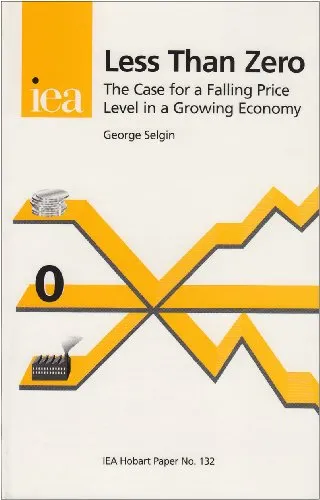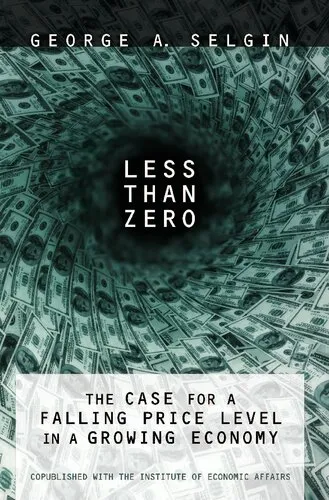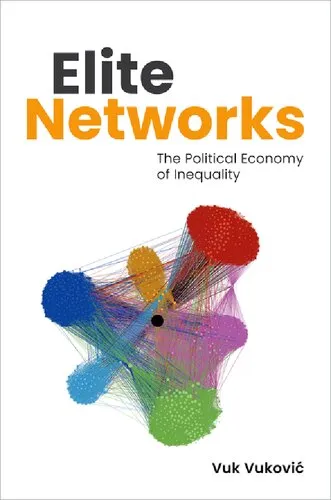Less Than Zero: The Case for a Falling Price Level in a Growing Economy (Hobart Papers)
4.3
بر اساس نظر کاربران

شما میتونید سوالاتتون در باره کتاب رو از هوش مصنوعیش بعد از ورود بپرسید
هر دانلود یا پرسش از هوش مصنوعی 2 امتیاز لازم دارد، برای بدست آوردن امتیاز رایگان، به صفحه ی راهنمای امتیازات سر بزنید و یک سری کار ارزشمند انجام بدینکتاب های مرتبط:
معرفی کتاب 'Less Than Zero: The Case for a Falling Price Level in a Growing Economy'
کتاب 'Less Than Zero: The Case for a Falling Price Level in a Growing Economy (Hobart Papers)' یکی از آثار برجسته اقتصادی است که به بررسی تأثیرات سطح قیمت کاهشی در یک اقتصاد در حال رشد میپردازد. این کتاب توسط جورج سِلجین نوشته شده و به زبانهای مختلف ترجمه گردیده است.
خلاصهای از محتوای کتاب
در این کتاب، سِلجین به بررسی این مسئله پرداخته که چرا در یک اقتصاد با رشد پایه پولی ثابت و بهرهوری فزاینده، سطح قیمتها باید کاهش یابد. او این ایده را زیر سؤال میبرد که تورم مثبت همواره لازم است. به جای آن، نویسنده استدلال میکند که یک سطح قیمت کاهشیافته میتواند نشاندهنده بهرهوری بالاتر و رشد واقعی اقتصادی باشد.
سِلجین به دقت بررسی میکند که چگونه تغییرات در سطح قیمت میتواند بر تخصیص منابع، افزایش تولید و رفاه اجتماعی تأثیر بگذارد. او در نهایت به این نتیجه میرسد که سیاستهای تثبیت سطح قیمت نه تنها ضروری نیستند بلکه میتوانند مانع از دسترسی به بهرهوری و شکوفایی بلندمدت شوند.
نکات کلیدی کتاب
- سطح قیمت کاهشی میتواند نشانهای از رشد اقتصادی باشد نه رکود.
- در اقتصادهایی با رشد بهرهوری بالا، نیاز به تورم برای حفظ رشد کمتر از آنچه که معمولاً تصور میشود، است.
- تغییرات غیرضروری در سیاست پولی میتواند موجب تلاطمهای اقتصادی بلندمدت شود.
نقلقولهای معروف از کتاب
«ثبات سطح قیمت تقریباً همیشه به عنوان یک معیار مطلوب سیاست پولی فرض شده است، اما این اولین فرضیهای است که باید به چالش کشیده شود.»
«سطح قیمتهای کاهشی میتواند بازتابی از افزایش بهرهوری و رفاه بیشتر در جامعه باشد.»
چرا این کتاب مهم است
این کتاب اهمیت ویژهای برای اقتصاددانان، سیاستگذاران و پژوهشگران دارد چرا که سنتهای معمولی دربارهٔ تورم و سیاست پولی را به چالش میکشد و دیدگاههای نوآورانهای دربارهٔ رشد اقتصادی و مدیریت پولی ارائه میدهد. با توجه به تغییرات سریع اقتصادی و تکنولوژیکی در دنیای امروز، درک رویکردهای جدید به سیاست پولی میتواند به توسعه پایدار جهانی کمک کند.
علاوه بر این، 'Less Than Zero' ابزاری قدرتمند برای به چالش کشیدن مفاهیم مرسوم در اقتصاد کلان ارائه میکند و خوانندگان را به تفکر دربارهٔ آینده سیاستهای اقتصادی تشویق میکند. این کتاب ارزشمند به ویژه در زمانهای بحران اقتصادی میتواند راهنمایی مؤثر برای شکلدهی پاسخهای سیاستی مناسب باشد.
Welcome to the insightful world of "Less Than Zero: The Case for a Falling Price Level in a Growing Economy" by George Selgin, a transformative piece that challenges conventional economic wisdom concerning price levels and economic growth. This work delves into the intricate relationship between inflation, deflation, and economic progress, providing fresh perspectives for students, academics, and policy-makers.
Detailed Summary of the Book
In "Less Than Zero: The Case for a Falling Price Level in a Growing Economy," George Selgin articulates a compelling argument for why a falling price level can coexist with economic expansion. Throughout the book, Selgin critically examines the prevailing consensus that stable or mildly inflationary price levels are essential for macroeconomic stability. He explores the historical and theoretical underpinnings of this belief, meticulously dissecting common misconceptions regarding deflation.
Selgin argues that moderate and predictable deflation resulting from technological advancements and productivity gains should be differentiated from harmful deflation that stems from monetary contraction. By doing so, he illuminates the potential benefits of allowing price levels to fall in a structured economic environment. Through historical examples and economic models, Selgin provides evidence to support his thesis that a declining price level, under the right circumstances, promotes efficient resource allocation, increases real wages, and enhances overall economic welfare.
Key Takeaways
- The distinction between 'good' and 'bad' deflation is critical; the former arises from positive supply shocks, while the latter is a result of demand contraction.
- A falling price level can lead to tangible benefits, such as improved purchasing power and higher real incomes, particularly when driven by productivity improvements.
- Monetary policy should be flexible enough to accommodate deflation driven by economic growth, rather than adhering to a rigid inflation target.
- The historical aversion to deflation is largely based on inaccurate associations with economic downturns, ignoring instances of benign deflation.
Famous Quotes from the Book
"The specter of deflation has been more imagined than real, a bogeyman that serves to keep alive the inflationary bias of modern monetary policy."
"Recognizing the difference between harmful deflation and beneficial price decreases is crucial for forming sound monetary policies."
Why This Book Matters
"Less Than Zero" is significant because it challenges mainstream economic beliefs and urges policymakers to reassess the automatic association of deflation with economic harm. In an era where monetary policy plays a pivotal role in economic strategy and planning, understanding the nuances of inflation and deflation is more crucial than ever. George Selgin's book equips readers with a deeper appreciation for how falling prices, in a context of productivity advances, not only signal but can also spur economic prosperity.
Moreover, the book contributes to a broader dialogue about the goals of central banking and the metrics by which economic health is judged. By advocating for the acceptance of benign deflation, Selgin proposes a paradigm shift that could have far-reaching implications for economic policy and global financial stability.
دانلود رایگان مستقیم
شما میتونید سوالاتتون در باره کتاب رو از هوش مصنوعیش بعد از ورود بپرسید
دسترسی به کتابها از طریق پلتفرمهای قانونی و کتابخانههای عمومی نه تنها از حقوق نویسندگان و ناشران حمایت میکند، بلکه به پایداری فرهنگ کتابخوانی نیز کمک میرساند. پیش از دانلود، لحظهای به بررسی این گزینهها فکر کنید.
این کتاب رو در پلتفرم های دیگه ببینید
WorldCat به شما کمک میکنه تا کتاب ها رو در کتابخانه های سراسر دنیا پیدا کنید
امتیازها، نظرات تخصصی و صحبت ها درباره کتاب را در Goodreads ببینید
کتابهای کمیاب یا دست دوم را در AbeBooks پیدا کنید و بخرید
1540
بازدید4.3
امتیاز0
نظر98%
رضایتنظرات:
4.3
بر اساس 0 نظر کاربران
Questions & Answers
Ask questions about this book or help others by answering
No questions yet. Be the first to ask!















